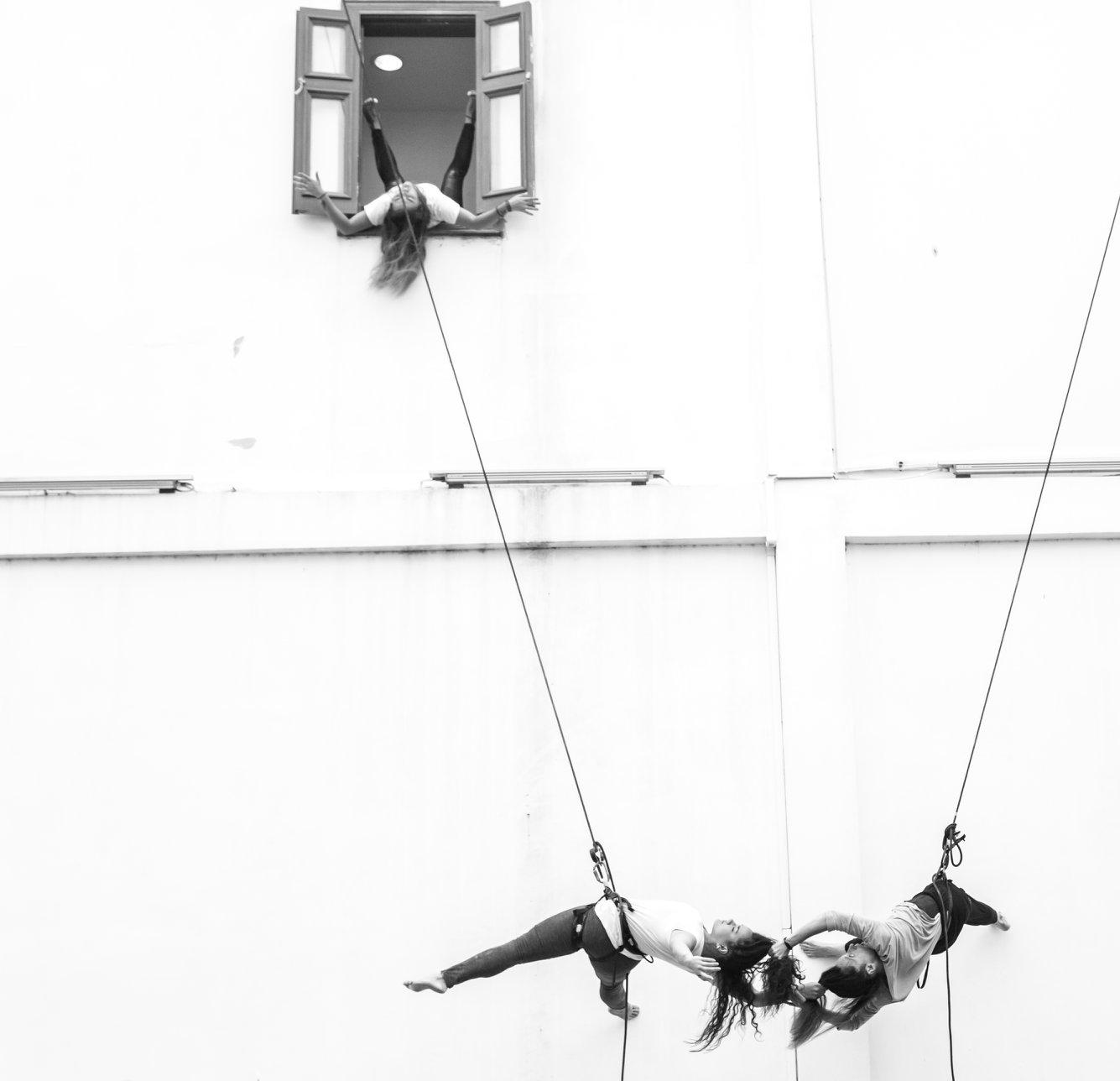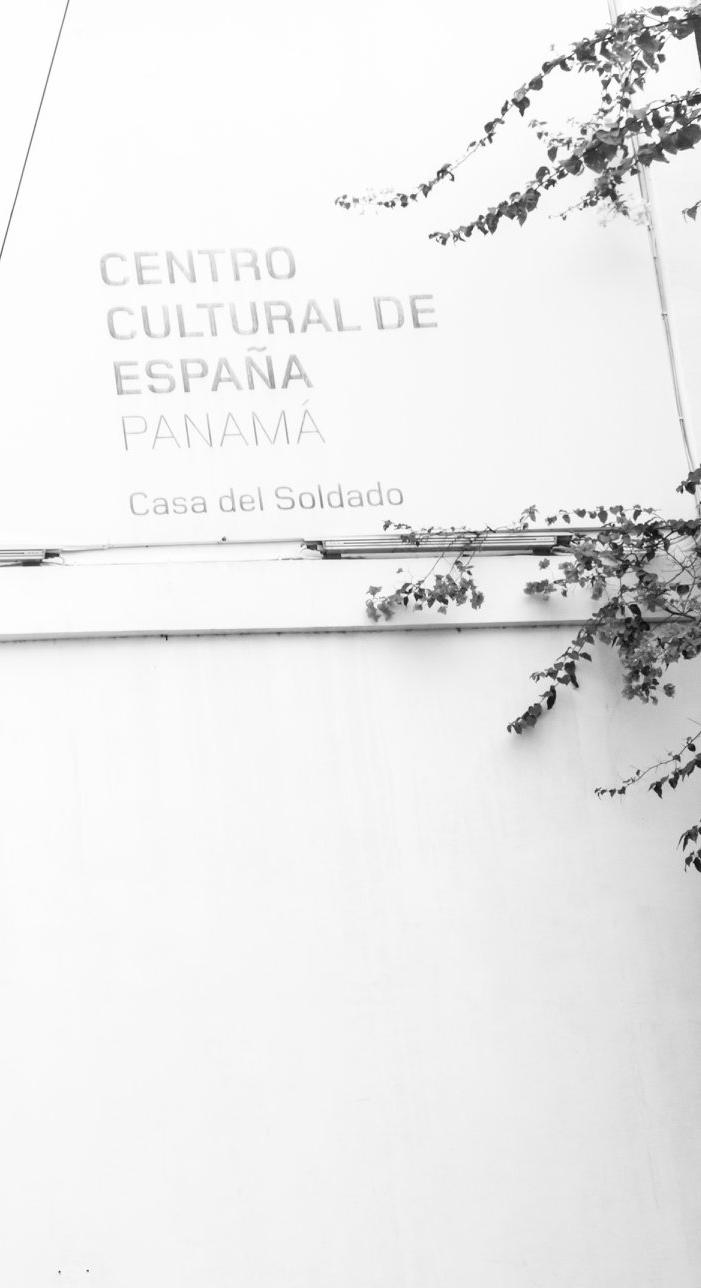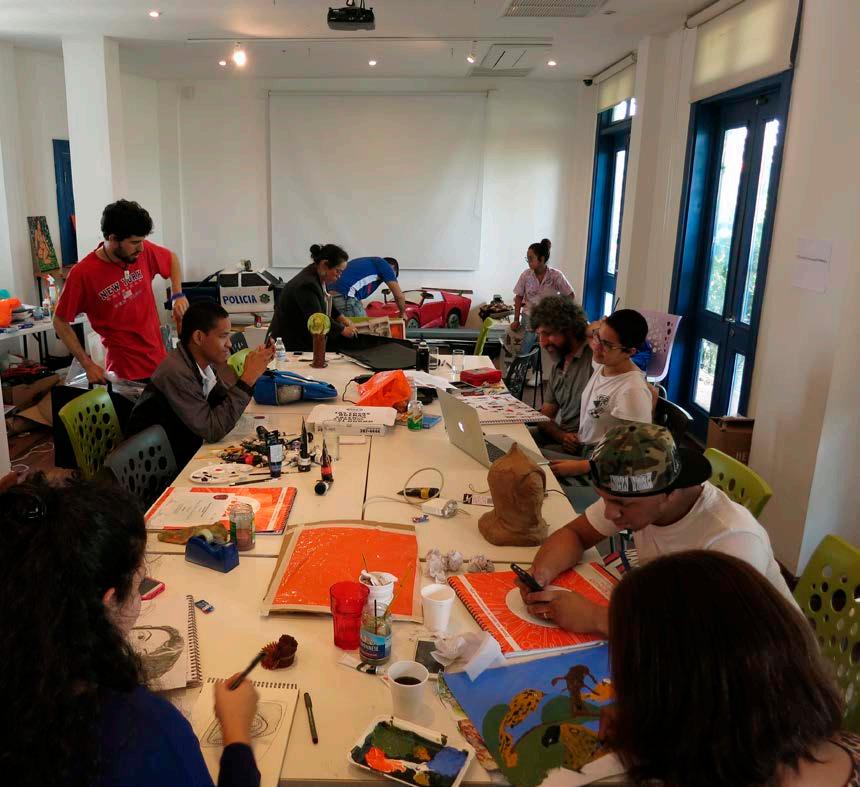
10 minute read
CCS Panamá
The Cultural Centre of Spain in Panama – Casa del Soldado (CCS/CdS) is a space for encounter, reflection and learning. A place for the transmission and exchange of knowledge, but above all, a space of community in Panama. In the Cultural Centre, community is understood as a place of refuge, somewhere we can escape from the commercial logic that prevails elsewhere and where we can adopt other perspectives, such as liking and listening. The Centre is associated with the Spanish Agency for International Development Cooperation (AECID), and managed by the Panama-Spain Foundation, a non-profit entity with participation by some of the leading Spanish businesses in the country. This Foundation channels private contributions to supplement the funding received from Spanish Cooperation. The CCS/CdS was inaugurated on 18 October 2013 by the Prince of Asturias, now King Felipe VI of Spain. Since then, it has formed part of the AECID Network of Spanish Cultural Centres. The Casa del Soldado de la Independencia, which hosts the Cultural Centre, is an exceptional building nestled in the centre of the Casco Antiguo (historic city centre) of Panama City, near Paseo Esteban Huertas and beside the city wall which once separated the elite from the less favoured sectors. The Centre is one of the few buildings located within the walls of the Casco Antiguo, which makes it both unusual and charming. Today, it is home to an exemplary programme of cultural activities, originating from Spain and from Panama. The building has a concrete structure and wooden floors, and was constructed in the early twentieth century. At the orders of Octavio Méndez Pereira, the then Education Secretary, the Archaeology and History Department of the National Museum was installed here in June 1925. The halls dedicated to History and Ethnography displayed a priceless collection of pre-Hispanic art which is currently housed in the Reina Torres de Araúz Anthropological Museum. The National Museum was relocated to new headquarters in the 1930s, and its former home was transferred to a charitable organisation for survivors of the struggle to separate what was then the province of Panama from Colombia in 1903. They were known as the “Soldiers of Independence”, and a small exhibition describing this episode was displayed. During the 1990s, the house was transformed into the headquarters of the National Heritage Directorate and, after a period of inactivity, it was restored in 2010 by AECID, with the support of the Panama Workshop-School. In recent years, the Casco Antiguo has been subjected to an aggressive process of gentrification which has radically changed the urban and social structure of the neighbourhood. Therefore, the relationship between the Cultural Centre and the local community is a fundamental part of its outlook, and the Centre undertakes projects aimed at engagement with its surroundings. The CCS/CdS is currently developing a mediation strategy, preparing a project to be implemented in conjunction with the community. The Centre identifies itself with the dynamics and problems of the neighbourhood, and fosters dialogue with its neighbours by promoting school visits, by means of a programme dedicated to working with the children living in the area, and by opening up spaces for debate and reflection. One aspect of the Centre that has remained unchanged since its origins is its encouragement of participation by the general public and by the local artistic community. The Centre has fostered meeting and discussions, and has made itself a home from home for groups of creators, researchers, users and its own personnel. Local participation is a key element in the Centre’s Strategic Plan. This participation is achieved by working with civil society.
1. Panamá Aérea, by the International Laboratory for the Creation, Dissemination and Research of Aerial Dance. Presented at the Cultural Centre, September, 2018

The Centre seeks to provide a platform and to be a catalyst for proposals, not just a producer or a shell for activities. In collaboration with the CCS/CdS, different groups and sectors have made use of this space for their activities, meetings and projects. These include Michita Café, associated with feminist groups, and BlaBlaLab, a programme of debates addressing subjects such as human rights, gender equality and current affairs. The Centre’s facilities are open for discussion and debate, in the view that these aspects are crucial to inclusion, tolerance and democratic health. However, giving citizens a voice and a stage does not make the Centre the protagonist in the project; it is the activists themselves who play the leading role, empowering themselves. The CCS/CdS supports local institutions and collaborates with them, especially in the area of training, under the ACERCA programme of Training for the Development of the Cultural Sector. One such area of collaboration is with the Directorate for Citizen Culture and Education of the Mayor’s Office of Panama, through the Points of Culture programme. This municipal project, carried out in conjunction with the Ministry of Education, transforms schools in the capital city into cultural spaces for community use during weekends. With the support of the Cultural Centre, several workshops focused on cultural management have been conducted under this programme for municipal staff. Another important activity performed by the CCS/CdS is the annual celebration of the Month of Black Ethnicity, which forms part of the Africa in America Festival organised by the Mayor’s Office. The Cultural Centre presents various activities within the framework of this festival, aimed at raising the profile of African-descendant culture in Panama. One of these activities is the exhibition La Travesía (The Crossing), about the culture of Congo, accompanied by an outdoor mural over 100 meters high, narrating the importance of blackness in the construction of the Panamanian identity. The Cultural Centre of Spain in Panama offers a permanent, varied programme of workshops and training courses intended not only to promote cultural management, but also to assist in the recuperation of the historic memory and heritage of the area, playing an active role in management and conservation with local counterparts. More specific


2. Encounter of artists, as part of the programme Trampolín, July 2018
3. Artists in the programme En una Papa, in a laboratory session in 2018
2
3 workshops are offered on drama and cinema, training and theatrical appreciation. During the last two years, moreover, the Centre has initiated a pedagogic line of action, oriented towards procedural and collaborative participation, self-publishing and the book as an instrument of individual and collective transformation. La Casa del Soldado provides an alternative space, and has a small library of this type of independent publishing output. These workshops and training activities may be classed as tangible projects; but other, less concrete, measures are also worthy of attention, such as the Centre’s prioritisation of debates about professionalisation, recognition and assistance for workers in the creative sector, internal work processes and forms of encounter and collaboration within the Cultural Centre. The 2030 Agenda and the Sustainable Development Goals are incorporated into the Centre’s Management Plan through its vision of culture as a generator of capacities for development. In a world that currently presents a state of alarming social deterioration, it is urgently necessary to discuss and enhance our understanding of these complex questions. In this respect, the CCS/CdS has been working for some years in the field of contemporary art. The broad-based, flexible discussions it holds facilitate research and new ways of thinking, in contrast to other, more formal, approaches. An example of this open-endedness is the programme En Una Papa (Making a name), an inclusive project to foster contemporary art that includes training, professionalisation and assistance with promotion for artists who, for whatever reason, normally work outside the standard art circuit and, in some cases, outside society. This project is an opportunity for them to make their name known, as artists and as artistic movements, and to highlight the importance of their participation in the socio-cultural life of the city. Contemporary artistic practices help us discuss and reflect upon the present through powerful images, with a strong poetic and symbolic content, which raise questions about what is usually considered ‘reality’. Through exhibitions, as well as broader, more extensive projects such as the Trampolín programme, the Cultural Centre has become a major point of reference for contemporary art projects.
4

4. Inauguration of the mural La Travesía, May 2019
Culture, in its most general expression, makes us human, helps us resist hegemonic discourses and lends us greater understanding. Culture, through its contribution to knowledge and its capacity to generate critical thought, is a key factor in encouraging respect for diversity, developing creative abilities and promoting real gender equality. Lastly, it is important to acknowledge the Centre’s contribution to the promotion and awareness of Spanish contemporary art and culture through international festivals held in Panama, as well as the projects and programmes offered in order to promote collaborative endeavours, both local and regional. Whether through the network of cultural centres of the region, or through its own projects, the CCS/CdS undertakes programmes for all of Central America. Its membership of the project Central American Artistic Residencies, within the AECID Network of Cultural Centres of the Agency, and its relationship with other institutions in the region, highlight the Centre’s success in helping Panama form part of the artistic circuits of Central America, thus overcoming its traditional isolation in this respect. After five years, many challenges remain to be faced, especially regarding participation and mediation. Apart from ensuring the continuation of local dialogue, it is essential to engage in self criticism, because access to culture as an instrument for human development is not a concept that should be restricted to the field of cooperation. The vision of culture as a human right is a challenge that should be addressed by all public cultural spaces and institutions.

5. Concert by the group Niños Mutantes in the Amador Theatre, September 2018
A house with its doors wide open
Adrienne Samos
Editor, curator and art critic. Co-founder and editor of the cultural magazine Talingo (1993-2007), winner of the Prince Claus of Holland Award in 2001.
I remember the high hopes many of us had when the Cultural Centre of Spain in Panama – Casa del Soldado, opened six years ago. “It’s about time!”, we exclaimed. Panama had been one of the few capitals in Ibero-America from which the AECID Network of Cultural Centres was still absent. People sometimes talk about “areas of silence”, territories whose isolation or terrible political situation asphyxiates the voices of culture. In Panama, it is quite the contrary. Nicknamed “the hub of the Americas”, the isthmus has one of the most buoyant economies in the continent, a stable democratic system and an optimal geographic location. People and goods from all over the world pass through, incessantly. Perhaps for this reason, major organisations in international management have prioritised much less favoured cities. Nevertheless, a country which enjoys intense commercial activity, and therefore an enviable level of income, does not necessarily distribute its wealth or its cultural climate proportionately. In Panama, it isn’t the silence, but rather the excess of noise that makes so many artistic talents and cultural scenes inaudible, so much so that they are deprived of all institutional support. Fortunately, Casa del Soldado has exceeded our expectations, to the point that it has become one of the few cultural spaces with a flourishing alternative programme. The facilities it offers are frequented and cherished not only by its neighbours, but by Panamanians in general and foreign residents as well, whether or not part of the artistic and academic scene. Over these last few years, the Centre has promoted innumerable exhibitions, book launches, workshops of all types and for all ages (but especially for the young), talks, round tables, debates, theatre, dance, film screenings, concerts…, apart from providing scholarships and residencies. It is apparent that these activities are generated or selected with great care, to maintain the Centre’s customary high quality, to reinforce links between the communities of Spain, Panama and the region, and to cross over the barriers between art (especially contemporary art), education, critical thinking and the public sphere. With a limited budget and a small team (almost all of whom are young women), the work of Casa del Soldado is carried out professionally, in good spirits and companionship. Much of its “invisible” work consists in providing professional advice – invaluable and yet free of charge – to creators and cultural managers. Likewise, anyone from the neighbourhood or further afield is welcome to visit its cosy library, which provides a space in which to work (with internet access) and to read. Metaphorically and literally, the doors of the house of Spain in Panama City are open to us all.

NICARAGUA Cultural Centre of Spain in Managua
Address
Primera Entrada a las Colinas, 7 cuadras arriba. Managua
Opened
2010
Web
http://www.ccenicaragua.org/










